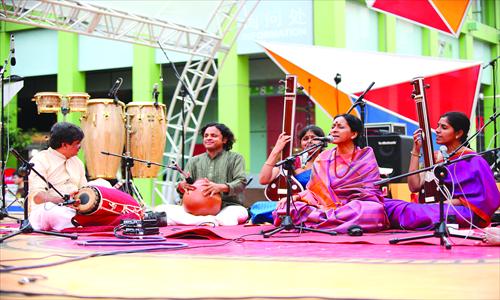
 |
| Jayashri and her ensemble perform at Lifehub@Jinqiao in Pudong New Area, Shanghai on May 4. Photo: Cai Xianmin/GT |
"My darling, the apple of my eye. Go to sleep, my dear precious one…Sleep humming…Sleep humming…" In the film Life of Pi, every time the young Pi was facing difficulties at sea, the song "Pi's Lullaby" would ring in his ears. The song was sung in Tamil, a language from Pi's hometown in southern India. It was as if the spirit of Pi's dead mother was encouraging him.
The song was actually sung by a real Indian mother, Bombay Jayashri, from Mumbai, who is also a famous Carnatic vocalist (a classic music system popular in southern India). The song earned these musicians an Academy Award nomination for Best Original Song.
'Pi's Lullaby'
It was also because of "Pi's Lullaby" that Jayashri and her six-member Carnatic music ensemble became much more well-known. As a result, they have received numerous invitations to perform Carnatic music in different parts of the world.
Now, they have come to China for the first time. After a performance on May 4 in Shanghai, they will give a concert tonight at the Forbidden City Concert Hall in Beijing.
For the group's first China tour, Jayashri will not only feature "Pi's Lullaby," but she and her ensemble will play some traditional Indian music.
"I think the main reason why Mychael Danna (the soundtrack composer for Life of Pi) invited me to write the lyrics of 'Pi's Lullaby' is because Danna used to listen to my rendition about 'Omana thingal kidavo,' a traditional Malayalam (a local dialect from southwest India) lullaby. And the time that I recorded that song was just when I was still singing lullabies for my own son," Jayashri told the Global Times in Shanghai.
She said that recording "Pi's Lullaby" was a beautiful learning experience for her. "Director Ang Lee is a genius who is so endearing and sensitive. Working on the song, both Lee and Danna explained to me the mood and feeling the song should evoke. And it was Lee and his Life of Pi that made me believe a child sleeps not because he is sleepy, but because he feels safe."
Jayashri added, "As a classical musician, my ideas are limited, but they guided me through this and the process was enriching."
Sense of calmness
The Global Times attended Jayashri's performance in Shanghai. The place they performed in is actually a crowded shopping plaza but when Jayashri began singing everything else went still.
A great sense of calmness and peace encircled her when she was sitting cross-legged and bare foot in the middle of the stage, singing with closed eyes and keeping her hands moving up and while simultaneously stirring her fingers. The other five musicians sat cross-legged and barefoot on three sides Jayashri.
"Carnatic music singers usually keep the beat by moving their hands up and down in specified patterns and using their fingers to keep time," Jayashri explained after the performance, "and we keep feet bare when we are performing, which is to show respect to our God."
According to Jayashri, Carnatic music was originally Hindu temple music. "What I sang and what they played could all be regarded as the conversation between man and our God, or man and our inner selves," Jayashri said, "It could be our prayer to the God or our quest to the God. And the music can express endless emotions between God and our minds."
The other five musicians in Jayashri's ensemble hold instruments, including a violin, two tanpuras (a long-necked lute that is plucked), one mridangam (a percussion drum) and one ghatam (a percussion instrument that looks like a clay pot).

















 Student makes 2nd stem cell donation
Student makes 2nd stem cell donation


![]()
